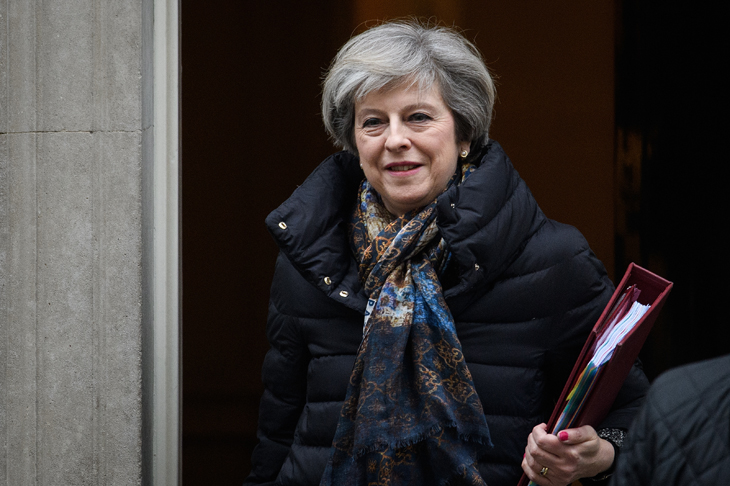After any other US election it would cause little comment that the new president had chosen the British Prime Minister for his first meeting with a foreign leader. Yet this time, Theresa May’s trip to Washington feels quite a coup. She has fallen out of favour with her fellow EU leaders, sent home from December’s summit in Brussels without any supper as they tried to portray her as internationally isolated. Yet here she is being invited to the White House, lured with the promise of a trade deal. How long ago it seems that Barack Obama was threatening to send Britain to the ‘back of the queue’ if the country voted for Brexit.
There are some who will think the Prime Minister ill-advised to be appearing as the best buddy of a president who is already deeply unpopular internationally and at home. Yet the meeting is not foremost about Donald Trump, however much the narcissist in him will disagree. It is about establishing freer trade between the people of Britain and those of the United States, something the EU tried but failed to do during Barack Obama’s time in office. Like it or not, if you want to do business with America, Donald Trump is now the man you have to deal with.
Theresa May’s primary objective will be to establish whether Trump is serious about doing a quick trade deal with Britain, and what progress might be made towards that aim before we leave the EU. The President’s tub-thumping protectionist speeches mask a more coherent idea: he dislikes -multilateral trade deals, preferring nation-to-nation ones. Various statements by him, combined with his action this week in withdrawing the US from the Trans Pacific Partnership (TPP) — the 12-country trade agreement signed by Obama but never ratified in Congress — suggest he is not anti-free trade but is against large trade blocs. Which, given that Britain is about to leave a large trade bloc, is helpful.
The best explanation of the Donald Trump phenomenon is that his supporters take him seriously but not literally, whereas his critics take him literally but not seriously. He is serious about global business, having built property interests overseas. So why would he want to hermetically seal the US economy from the rest of the world? His protectionism appears to derive from his suspicion that some emerging economies are manipulating their currencies and sweating their labour forces in order to undercut American workers. Neither charge can reasonably be levelled at Britain, even if our currency has undergone a welcome correction.
Trump’s move against trade blocs reverses overnight 60 years of foreign policy during which European unity was encouraged by the US State Department. This change will not make life easy for the EU, bruised as it already is by the collapse of the US trade deal. But by setting in motion its departure from the EU, Britain has inadvertently pre-empted the effects of the changed US policy. The offer of a quick deal with the US is an opportunity which must be seized, and would go a long way to silencing those who insist Britain will find it hard to do business outside the EU. But it will also offer a challenge to Brexiteers, who used the -prospect of a EU-US free trade deal as a -reason to vote for Brexit, arguing that it would give American corporations too much access to our markets (especially the NHS).
Over the past few decades, Tories have pursued the idea of free trade like dogs chasing a car. But now that a deal is being offered by a US president, who is deadly serious, it raises several awkward questions. Are the Tories true liberals? They might cheer at the prospect of a one-page free-trade agreement with Australia, but what if that means undercutting British farmers? If the US Congress wants access to the NHS for American healthcare firms, would it be a deal-breaker? Might the Brexiteers start to protest about the NHS being made a sacrificial offering on the altar of neoliberalism? Even Michael Gove was making such noises during the referendum campaign. The Brexiteers’ bluff might be called sooner than they think.
Theresa May’s other priority will be to gain assurance over the future of Nato. Of all Trump’s rash statements since he declared his candidacy, his suggestion that Nato is ‘obsolete’ is one of the most deeply worrying. True, Nato was founded during a Cold War which ended a quarter of a century ago, but the threat to European security remains. In a continent made up of small nations, a collective commitment to security is vital.
It may be that Trump made his remark in an attempt to shame laggard nations who are failing to stick to their agreement to spend proper amounts on defence. His defence secretary James Mattis’s comments on the US’s ‘unshakeable commitment to Nato’ certainly suggest that is the case. If so, Trump is quite right. The combined GDP of the 27 non-US Nato member states exceeds that of the US, and yet between them they are spending less than half what the US does on defence. Britain meets the 2 per cent target, but France, Germany, Italy and Turkey are among the countries which are failing to do so.
It emerged this week that Angela Merkel and her aides have been poring over an interview with Donald Trump in a 1990 issue of Playboy to try to glean some insight into his philosophy on trade. Theresa May has the advantage of being the first to be in a position to judge his sincerity personally. It is an opportunity she cannot afford to waste.
Got something to add? Join the discussion and comment below.
Get 10 issues for just $10
Subscribe to The Spectator Australia today for the next 10 magazine issues, plus full online access, for just $10.
You might disagree with half of it, but you’ll enjoy reading all of it. Try your first month for free, then just $2 a week for the remainder of your first year.














Comments
Don't miss out
Join the conversation with other Spectator Australia readers. Subscribe to leave a comment.
SUBSCRIBEAlready a subscriber? Log in